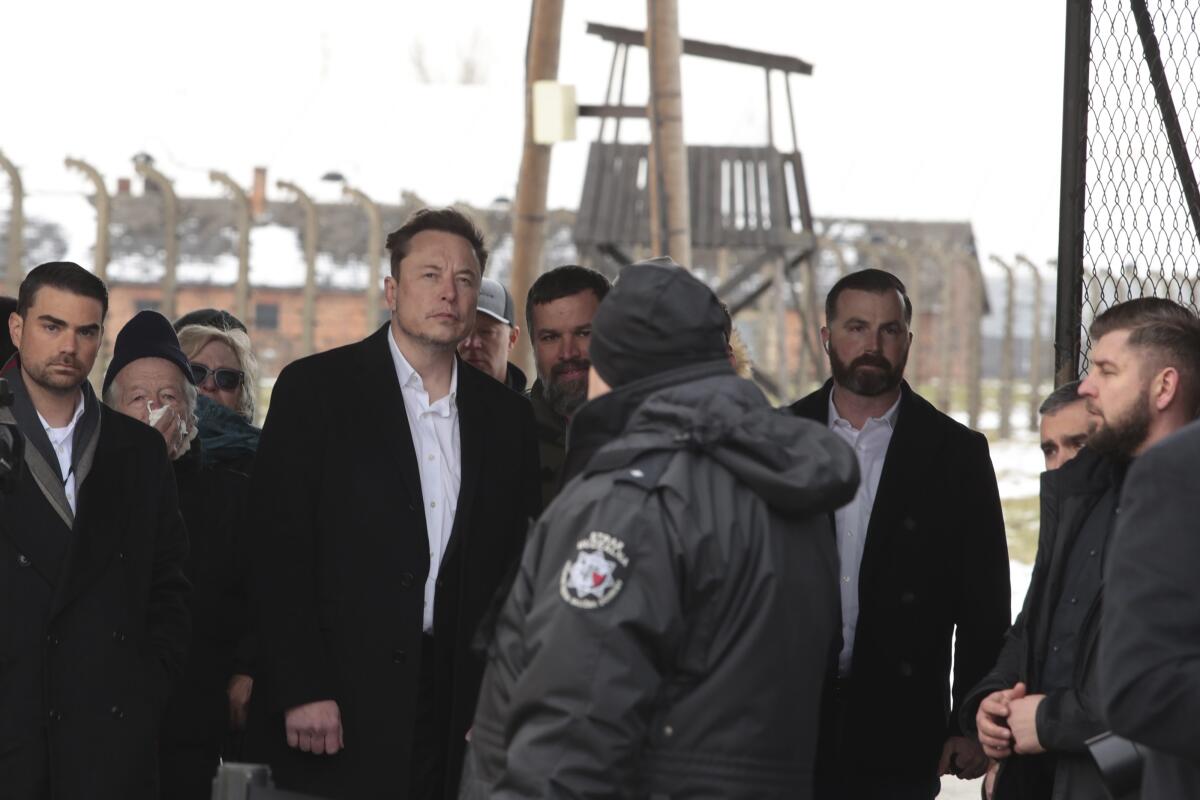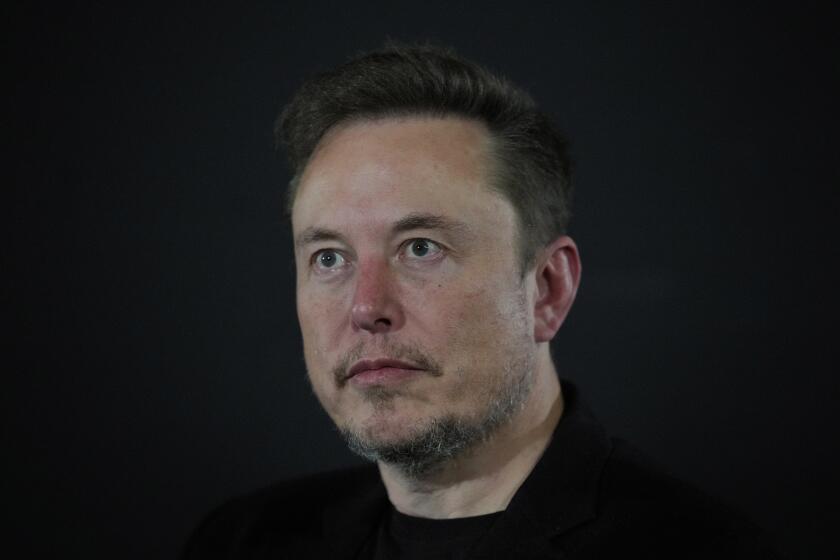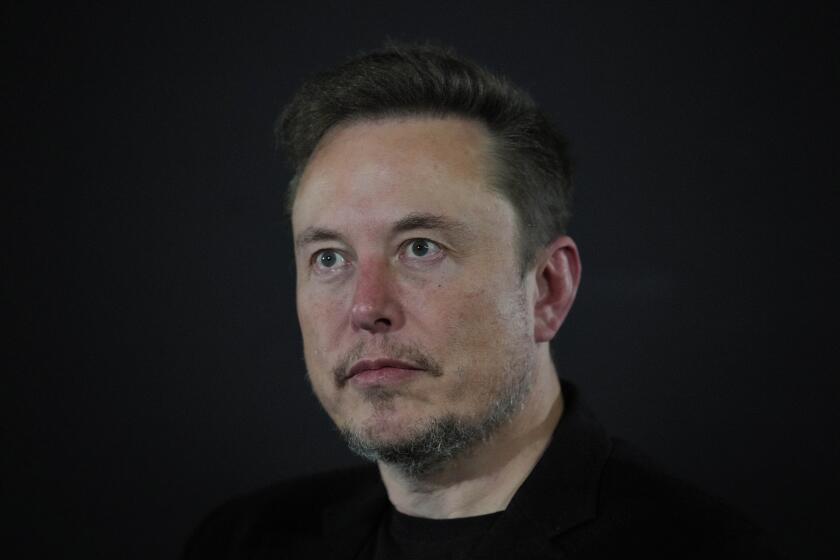Elon Musk visits Auschwitz after uproar over antisemitic messages on X

- Share via
Elon Musk, who has been accused of allowing antisemitic messages on his social media platform, X, visited the site of the Auschwitz-Birkenau death camp on Monday, saying afterwards that the tragedy of the Holocaust “hits you much more in the heart when you see it in person.”
Musk toured the most notorious extermination camp established by Nazi Germany during World War II before attending a conference on antisemitism organized by the European Jewish Assn. in the nearby Polish city of Krakow.
He admitted to having been “naïve” about the extent of antisemitism until recently, saying that is because most of his friends are Jewish and he has had little contact with it in his own life.
“In the circles that I move, I see almost no antisemitism,” Musk said at the conference in a discussion with Daily Wire podcaster Ben Shapiro. “And, you know, there’s this old joke ‘I’ve got like this one Jewish friend.’ No, I have like two-thirds of my friends are Jewish. I have twice as many Jewish friends as non-Jewish friends. I’m like Jewish by association, I’m aspirationally Jewish.”
He defended his X platform as a a place where freedom of speech flourishes, saying that a free exchange of ideas is something that ultimately helps to correct hatred, noting that the Nazis shut down freedom of press and information.
Fallout from an Elon Musk post endorsing antisemitic views keeps spreading, with Tesla investors criticizing him and more advertisers fleeing X.
“The overarching goal for the X platform is to be the best source of truth in the world,” he said. The “relentless pursuit of the truth is the goal with X and allowing people to say what they want to say, even if it’s controversial, provided that it does not break the law.”
The billionaire has faced accusations from the Anti-Defamation League, a prominent Jewish civil rights organization, and others of tolerating antisemitic messages on the platform, formerly known as Twitter, since purchasing it in 2022.
He sparked an outcry in November, including from the White House, when he responded on X to a user who accused Jews of hating white people and professing indifference to antisemitism by posting, “You have said the actual truth.” He later apologized for the comment, calling it the “dumbest” post that he’s ever done.
Several big brands, including Disney and IBM, stopped advertising on the platform last year after liberal advocacy group Media Matters said that their ads were appearing alongside pro-Nazi content and white nationalist posts. X has since sued Media Matters, saying the Washington-based nonprofit manufactured the report to “drive advertisers from the platform and destroy X Corp.”
Musk visited the Auschwitz-Birkenau site with his 3-year-old son and others, including Shapiro and the founder and head of the European Jewish Assn., Rabbi Menachem Margolin. The site, near the town of Oswiecim in southern Poland, is fenced off with barbed wire. Wooden barracks for the prisoners and the ruins of gas chambers endure as evidence of Nazi crimes. There is also a monument to the victims where remembrance ceremonies are held yearly.
Elon Musk has gone full antisemite, raising questions about the future of his companies and their relationships with commercial and government entities.
“It was incredibly moving and deeply sad and tragic that humans could do this to other humans,” Musk said about the visit. “I’m a student of history, so I had seen the pictures, I’d seen the videos, but ... it hits you much more in the heart when you see it in person.”
Musk had been expected to make the visit on Tuesday and take part in a memorial service, together with political figures attending the EJA conference in Krakow, but showed up at the camp on Monday instead.
“Due to schedule concerns, before Elon Musk’s arrival to the European Jewish Association conference, he took part in a private visit to Auschwitz-Birkenau with EJA Chairman Rabbi Menachem Margolin, Ben Shapiro and Holocaust survivor Gidon Lev. Musk laid a wreath at the wall of death and took part in a short memorial ceremony and service by the Birkenau memorial,” the EJA said in an email.
Oliver Bradley, an EJA media advisor, said the organization “challenged” Musk to come to Auschwitz during a Zoom conference on antisemitism in social media several months ago.
“Musk shrugged his shoulders at the suggestion stating that he already knew the history of the Holocaust ... as if visiting might not be an impactful experience,” Bradley said.
But Margolin, the EJA chairman, “successfully convinced Musk of the necessity of experiencing a place of genocide in order to even begin to truly fathom the dimension of the Holocaust,” Bradley said.
Elon Musk visited Israel, where he toured a kibbutz that was attacked last month by Hamas militants and met with top leaders.
X, the social media platform that Musk bought when it was known as Twitter, didn’t respond to a request for comment about his trip, sending an automated message saying, “Busy now, please check back later.” SpaceX, Musk’s rocket company, also didn’t respond to email requests for comment.
The EJA conference on the rise of antisemitism was held in Krakow before International Holocaust Remembrance Day on Jan. 27.
More than 1.1 million people were murdered by the Nazis and their henchmen at Auschwitz during World War II. Most who were killed were Jews, but the victims also included Poles, Roma, Soviet prisoners of war, and others. In all, about 6 million European Jews died during the Holocaust. When the Soviets liberated the camp, they found about 7,000 survivors.
Musk said that had there been social media at the time of World War II, the Holocaust “would have been impossible to hide” and lives could have been saved.
AP writer Kelvin Chan in London contributed to this report.
More to Read
Inside the business of entertainment
The Wide Shot brings you news, analysis and insights on everything from streaming wars to production — and what it all means for the future.
You may occasionally receive promotional content from the Los Angeles Times.













